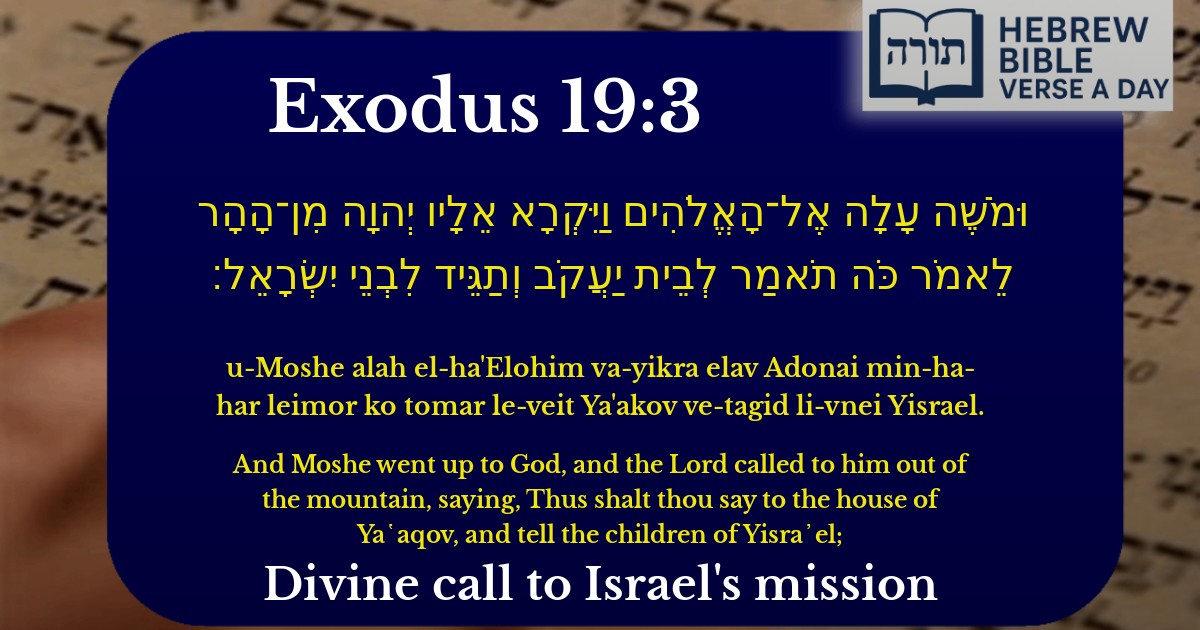Join Our Newsletter To Be Informed When New Videos Are Posted
Join the thousands of fellow Studends who rely on our videos to learn how to read the bible in Hebrew for free!
Hebrew Text
וּמֹשֶׁה עָלָה אֶל־הָאֱלֹהִים וַיִּקְרָא אֵלָיו יְהוָה מִן־הָהָר לֵאמֹר כֹּה תֹאמַר לְבֵית יַעֲקֹב וְתַגֵּיד לִבְנֵי יִשְׂרָאֵל׃
English Translation
And Moshe went up to God, and the Lord called to him out of the mountain, saying, Thus shalt thou say to the house of Ya῾aqov, and tell the children of Yisra᾽el;
Transliteration
U-Moshe alah el-ha'Elohim va-yikra elav Adonai min-ha-har leimor ko tomar le-veit Ya'akov ve-tagid li-vnei Yisrael.
Hebrew Leining Text
וּמֹשֶׁ֥ה עָלָ֖ה אֶל־הָאֱלֹהִ֑ים וַיִּקְרָ֨א אֵלָ֤יו יְהֹוָה֙ מִן־הָהָ֣ר לֵאמֹ֔ר כֹּ֤ה תֹאמַר֙ לְבֵ֣ית יַעֲקֹ֔ב וְתַגֵּ֖יד לִבְנֵ֥י יִשְׂרָאֵֽל׃
Parasha Commentary
📚 Talmud Citations
This verse is quoted in the Talmud.
📖 Shabbat 88a
The verse is referenced in the context of discussing the giving of the Torah at Mount Sinai and the unique relationship between God and the Jewish people.
📖 Yoma 4b
The verse is cited in a discussion about the nature of prophecy and Moses' unique role as a prophet.


Moses' Ascent to God
The verse states, "And Moshe went up to God" (Exodus 19:3). Rashi explains that this ascent was not merely physical but also spiritual, representing Moses' unique closeness to the Divine. Unlike other prophets who received visions in dreams or parables, Moses communicated with Hashem directly, as it says, "mouth to mouth I speak with him" (Numbers 12:8). The Midrash Tanchuma (Yitro 11) adds that this ascent prepared Moses to receive the Torah on behalf of the Jewish people.
The Divine Call from the Mountain
The verse continues, "and the Lord called to him out of the mountain." The Ramban (Nachmanides) notes that the mountain—Mount Sinai—symbolizes permanence and stability, teaching that Torah is an eternal covenant. The Sforno emphasizes that Hashem initiated this call, demonstrating His desire to establish a relationship with Israel through the giving of the Torah.
Distinction Between "House of Yaakov" and "Children of Israel"
Hashem instructs Moses: "Thus shalt thou say to the house of Yaakov, and tell the children of Yisrael." Rashi, citing the Mechilta, explains that "house of Yaakov" refers to the women, while "children of Yisrael" refers to the men. This teaches that the Torah was given first to the women because they are the foundation of the Jewish home and ensure its transmission to future generations. The Kli Yakar expands on this, noting that women's spiritual sensitivity makes them essential partners in accepting the Torah.
Preparation for Matan Torah
The Ohr HaChaim highlights that this verse sets the stage for the giving of the Torah, emphasizing unity—both between men and women and among the entire nation. The Talmud (Shabbat 88a) teaches that Israel's acceptance of the Torah at Sinai was only complete when they reaffirmed it willingly in the days of Purim, showing that true Kabbalat HaTorah requires ongoing commitment.